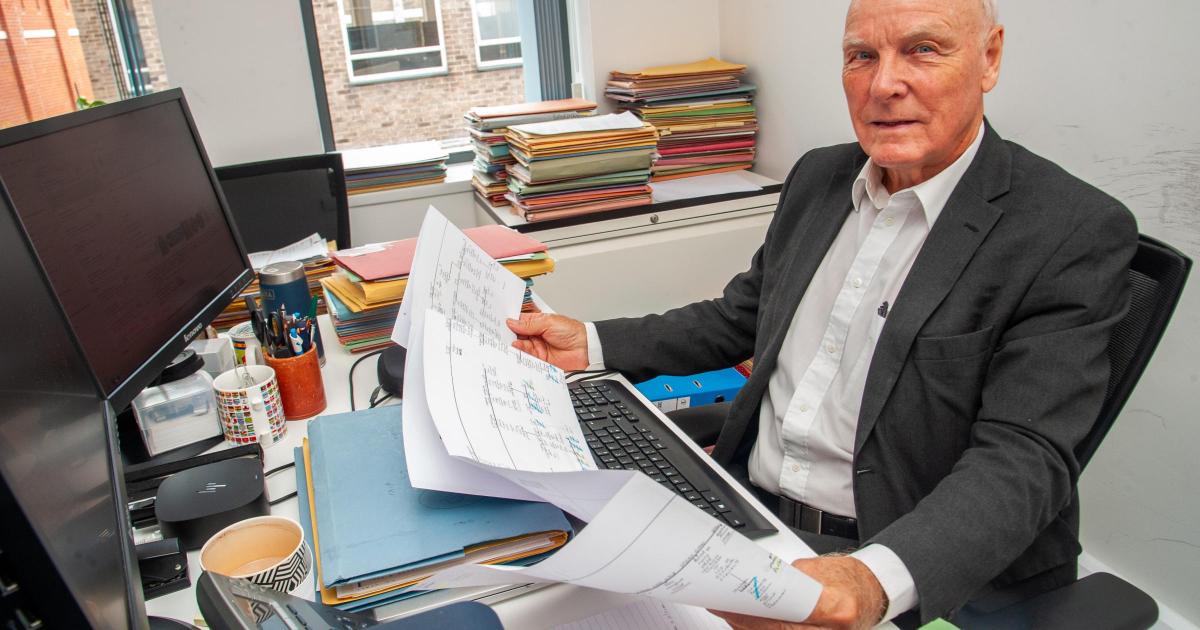Peter Turvey – owner and founder of Anglia Research Services – began to see a disturbing pattern after the probate process was digitised around 2017-19.
Documentary makers at Radio 4 have recently produced a podcast called The Grave Robbers based on his discoveries.
SIGN UP HERE FOR YOUR DAILY BUSINESS BULLETIN
Peter Turvey with members of his team at Anglia Research Services (Image: Lucy Taylor) Peter’s company searches for heirs where people die intestate and it has been going for many years.
But having found the lost heirs, wills – which he claims are fake – started to be produced.
He found a dozen cases, all involving London-based elderly deceased who lived alone.
More: ‘Outgoing and sociable’ business owner dies aged 63 from disease with no cure
In these cases, people with Hungarian names claimed they were the executors and beneficiaries.
(Image: Lucy Taylor) However, there didn’t appear to be any known connection with these people and the deceased.
He looked into it further and found that executors appeared to be vastly undervaluing properties on the grant of probate.
This prevented them going above an HMRC threshold where inheritance tax has to be paid – but any semi-detached house in a reasonably affluent part of London would now exceed that limit, he says.
More: Freight company relocates to Felixstowe town centre
“Talk about red flags,” he says.
He believes the digitisation of probate has enabled fraud to take root. “Up until 2017 every city and large town like Ipswich had its own probate registry on the high street,” he says.
(Image: Lucy Taylor)
In Ipswich’s case it was on Arcade Street. These are now gone, he says, and the process has shifted online.
“When you wanted to obtain probate on a will you had to attend at the probate registry and show the will and show your identity and these wills would not have got past that system.
“Now they are online there appear to be no checks and balances.”
What first sparked his team’s suspicions after probate moved online was when wills appeared where individuals were thought not to have left a will.
“They were home-made wills – they had not been drawn up by lawyers. They were always vulnerable elderly people who had been independent enough to live on their own and were property owners.”
His firm is representing about 100 heirs they have identified in the dozen cases they unearthed over the last four years where they think a fake will has been made.
More: Tributes paid to ‘lovely’ farmer and Suffolk trust stalwart who has died at 87
The business is family-owned and Peter’s two sons, Philip and Richard, run the company with Peter.
Many of the heirs the company finds have never heard of the deceased because they are distantly related, he says.
As genealogists, Anglia Research Services looks for people for a variety of clients including law firms and local authorities.
Today Peter’s firm employs more than 40 people, and is supported by satellite offices across the UK and overseas.
He founded the business – which specialises in probate genealogy and legal support services – in 1979 in Suffolk and has expanded his team of researchers.
Through the 1990s and 2000s the company grew rapidly and in 2004 moved to Princes Street before settling into its current headquarters in Museum Street in 2012.
It is now one of the UK’s leading probate research firms and has appeared on TV shows including Who Do You Think You Are?, A House Through Time, and Key to a Fortune.
One of the firm’s aims is to reunite missing heirs with their unclaimed fortunes and in return charges a small finder’s fee, says Peter.
To do this, it uses a list of unclaimed estates called Bona Vacantia which is used to advertise the estates to enable potential heirs to come forward and claim their inheritance where someone has died intestate and with no known family.
If the assets aren’t claimed, they go to the Crown.
Since the BBC podcast on fake wills, the site has been taken offline. A message on gov.uk says: “We have temporarily removed the unclaimed estates list from our website.”
Peter reported his concerns about fake wills being made up on a large scale to various authorities including Action Fraud back in 2023.
But he has been frustrated by what he sees as a slow response and has taken the matter up with Ipswich MP Jack Abbott who has pursued the matter for him.
Peter was directed to the National Fraud Intelligence Bureau in London and presented it with the considerable amount of research he carried out.
It says it has passed the matter on to another police body.
Chief Superintendent Amanda Wolf, head of Action Fraud and National Fraud Intelligence Bureau (NFIB), said Action Fraud received the complaint on June 26, 2023.
“It was sent to Metropolitan Police Service for consideration for investigation,” she said.
The Metropolitan Police Service said: “The investigation was shared with our Crime Recording Investigations but ultimately sent back to the City of London Police due to no victims being identified in the report. No Met investigation took place.”
Peter Turvey at work (Image: Lucy Taylor)
